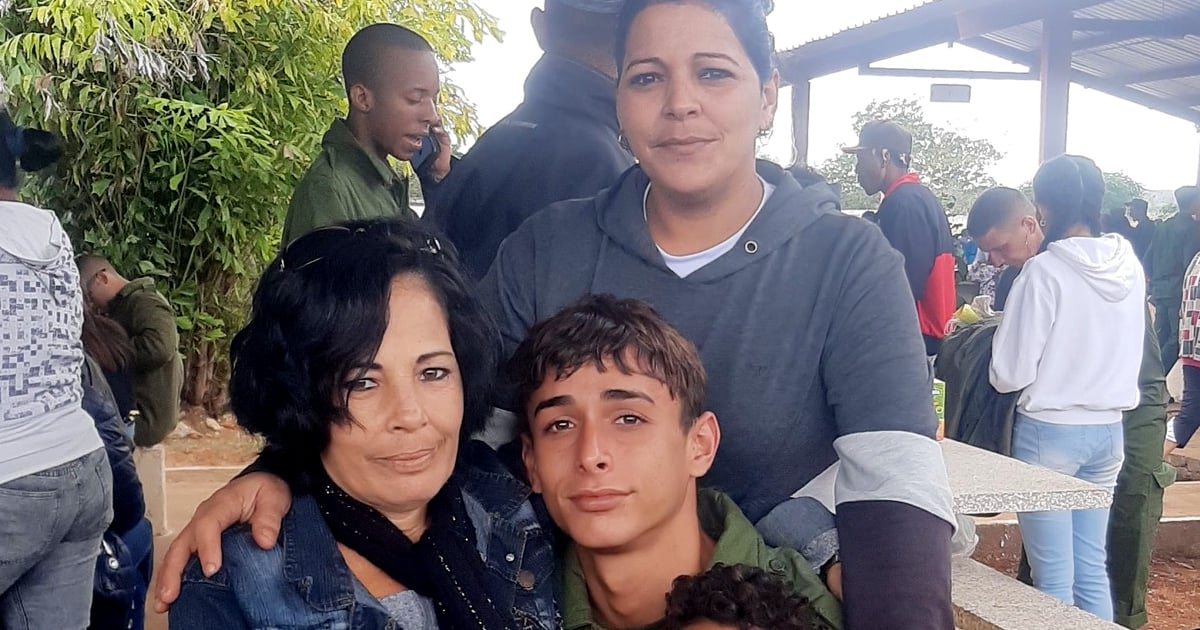Anisleydis Suria, mother of the young Sergio Díaz Suria, who was recently imprisoned for refusing to join the Revolutionary Armed Forces (FAR), has publicly opposed mandatory military service. The Cuban resident of Cárdenas, Matanzas, revealed on social media that she traveled to Santa Clara to visit her son in prison, only to be allowed a mere 30-minute visit.
Suria, who has already voiced her determination to fight for her son's release on social media, reiterated her discontent with the injustice facing her son and declared her opposition to mandatory military service in Cuba—a country under a totalitarian regime that employs violence against those who oppose the dictatorship and uses army recruits as slave labor under deplorable conditions.
"No to mandatory military service," said Díaz Suria's mother on Facebook this Saturday, in a post where she once again expressed the pain caused by her son’s imprisonment for objecting to military service. "After four days without knowing about you, we left around 4 a.m. heading to Santa Clara to see you and find out how you were. After such a hard journey, they tell me your visit is only half an hour. What an abuse!" lamented the prisoner’s mother.
Increasing Opposition to Military Recruitment
In recent years, numerous young people and their families have voiced their opposition to FAR recruitments, pointing out the injustices and inequalities plaguing the selection process, from which the children of regime-connected elites are "exempt." The tragic incidents involving adolescents during mandatory military service are increasingly frequent, although the Cuban government attempts to silence such events.
Numerous social media reports have documented a growing number of deaths among young Cubans related to military service, many due to suicide.
Cuban Government Denies Mandatory Military Service at the UN
In May 2022, thousands of Cubans reacted with outrage on social media when a regime diplomat claimed before the United Nations Committee on the Rights of the Child (CRC) that military service in Cuba was "voluntary." This statement manipulated the content of the National Defense Law, which explicitly states the obligatory nature of service for males.
In Chapter VIII, Section Three (Article 77), the law establishes that "male citizens, during the year they turn sixteen years old, are obliged to formalize their registration in the military register." The law also states that "once registered in the military register, citizens are required to fulfill activities aimed at preparing them for joining military service and to keep their status duly updated."
In 2019, Cuban military courts imposed penalties on military service recruits who self-harm to be discharged, a common practice in recent decades, with many regrettable incidents as a consequence.
The obligatory nature of military service has been systematically criticized by Cubans, who even promote campaigns on social media to pressure for its elimination. However, reality shows that recruitment did not stop even during the coronavirus pandemic, a matter severely questioned by the public.
Frequently Asked Questions About Mandatory Military Service in Cuba
Given the increasing opposition to mandatory military service in Cuba, many questions arise about its nature and implications. Here are some frequently asked questions and their answers:
Is military service mandatory for all young men in Cuba?
Yes, according to the National Defense Law, all male citizens are required to register for military service when they turn sixteen.
Are there any exemptions from mandatory military service?
While the law mandates service for all males, there are reported exemptions for the children of elites and those connected to the regime.
What are the consequences for refusing military service in Cuba?
Refusing military service can lead to imprisonment, as seen in the case of Sergio Díaz Suria.
How has the public reacted to the mandatory military service policy?
The public has reacted with increasing opposition, often voicing their dissent on social media and campaigning for the elimination of mandatory service.
